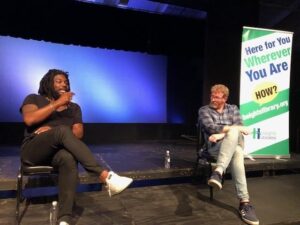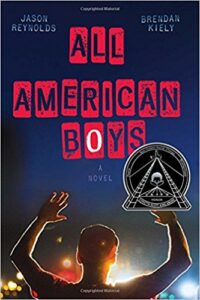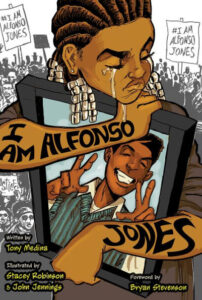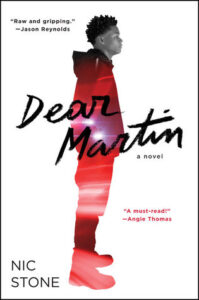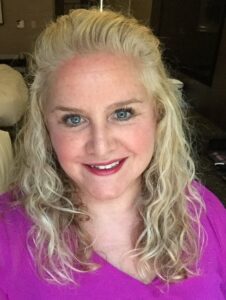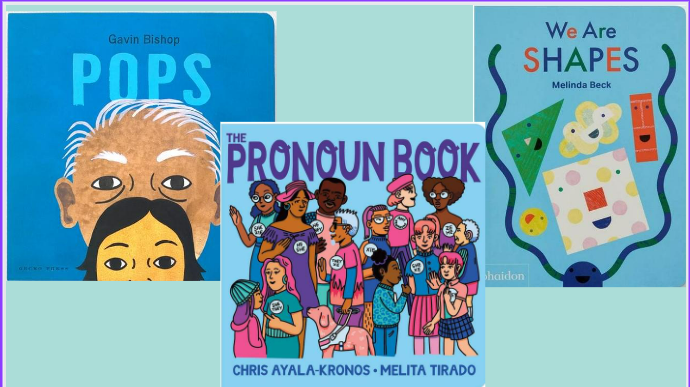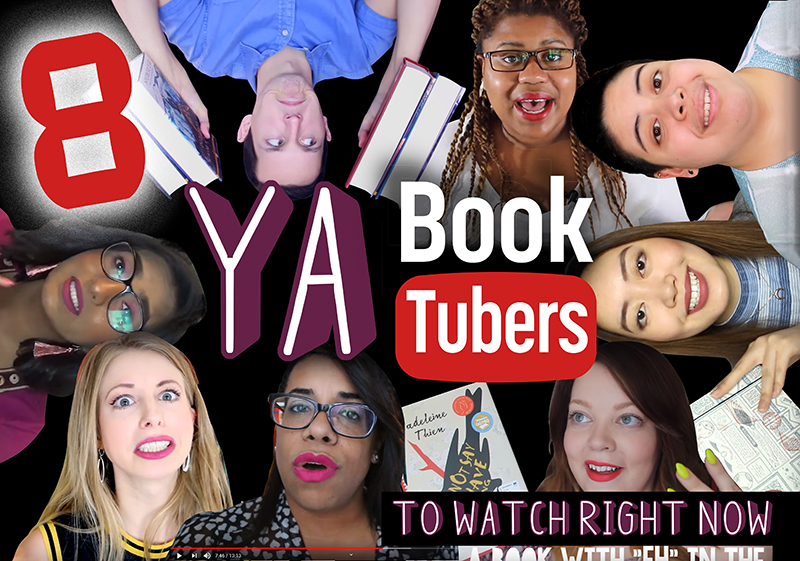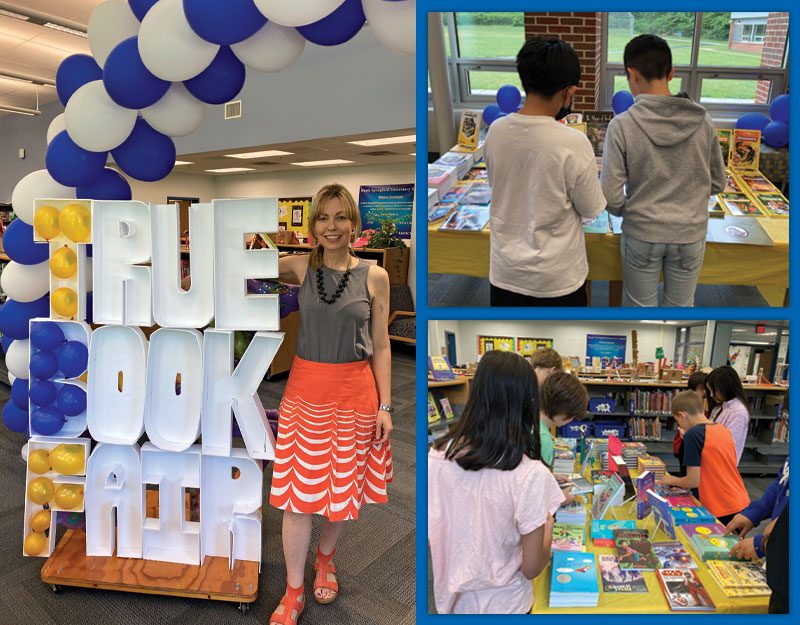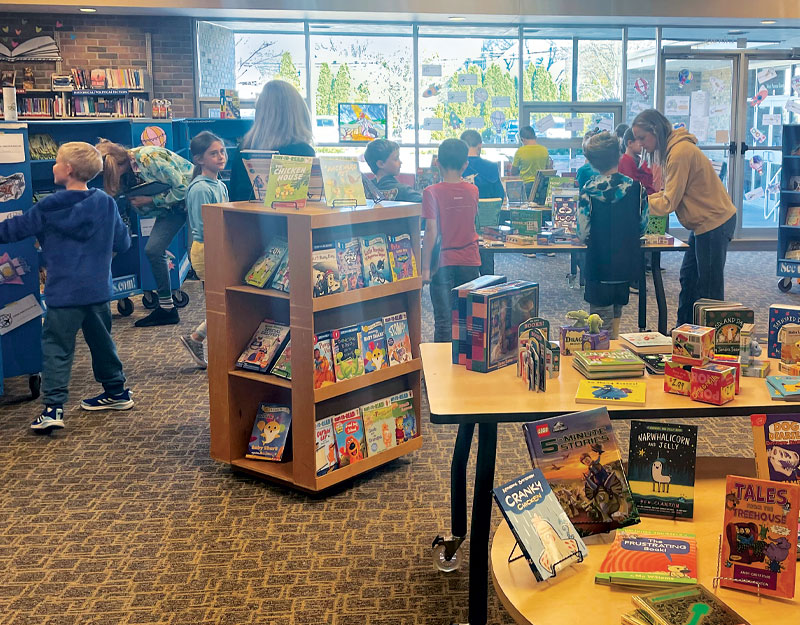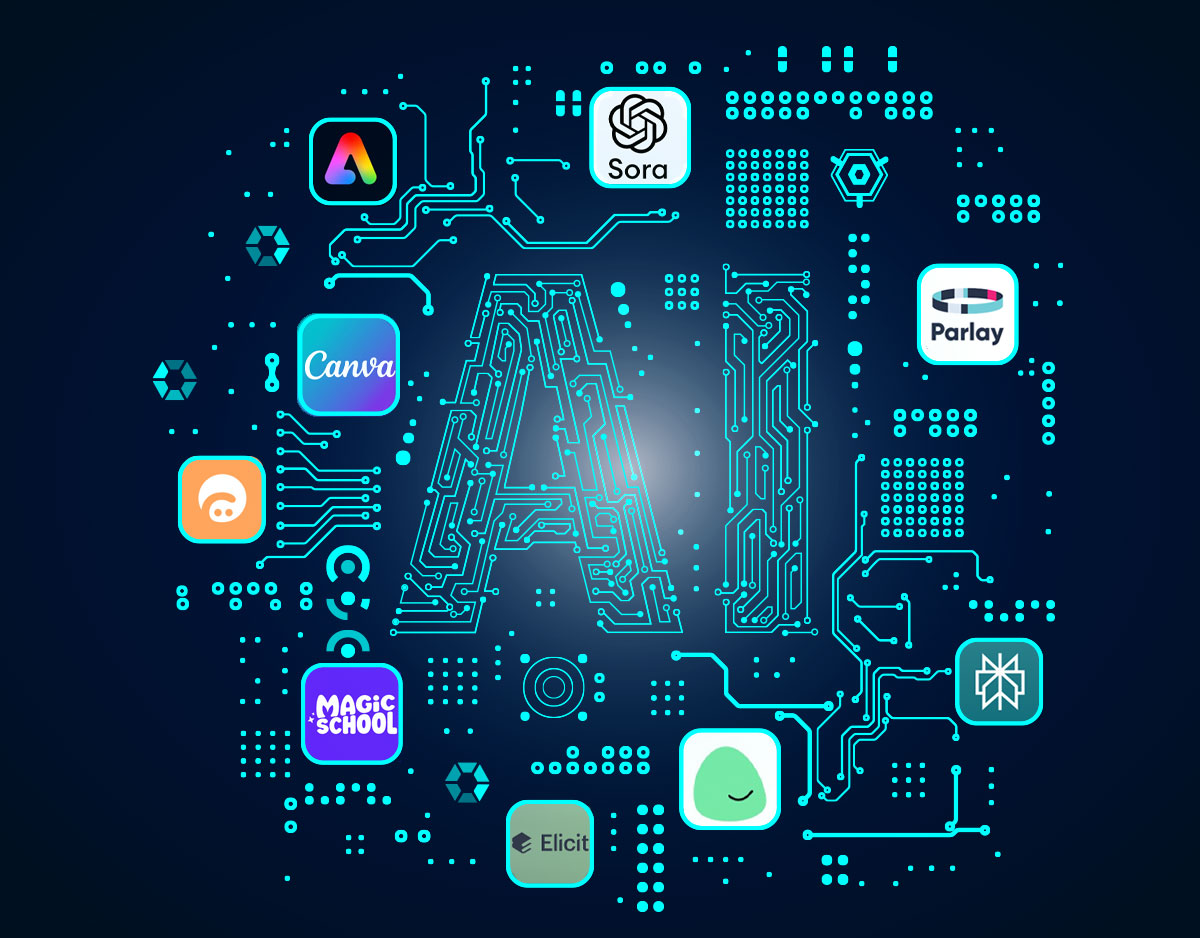“All American Boys” Authors Jason Reynolds and Brendan Kiely Discuss Racism, White Privilege, and Censorship in Today’s Civic Landscape, a guest post by Lisa Krok
In the midst of a week full of national dissent and tension, Jason Reynolds and Brendan Kiely took to the stage to get real with a live audience. The Ensemble Theatre in Cleveland Heights, Ohio was the perfect venue for an intimate discussion on serious subjects. Reynolds and Kiely first became friends a few years back while touring for their debut books, When I Was the Greatest and The Gospel of Winter, respectively. The Trayvon Martin tragedy had occurred already, and after Michael Brown was killed in Ferguson, Missouri, the two friends had some candid discussions about racism and police brutality. This prompted them to begin writing All American Boys together. Told in alternating perspectives of Reynold’s black teen, Rashad Butler, and Kiely’s white teen, Quinn Collins, the story opens with Rashad being beaten by a police officer while Quinn witnesses from down the street. As the plot unfolds, family, friends, and the community have different takes as to the officer’s culpability. When protests begin with kids at school, Quinn has mixed feelings about what to do next.
Aside from the Martin and Brown situations, the authors had their own anecdotes from their teenage years that sparked their interest in collaborating on the book. Reynolds’ terrifying run-in with D.C. police at age 16 while in a car with friends couldn’t be more opposite of Kiely’s tale of being pulled over while driving his mom’s minivan in Boston. While Reynolds and his black friends were presumed to be criminals, Kiely and his white friends were let off and told to go home and be safe. Why? Racism and white privilege. Both were polite and respectful to police, but nonetheless, biases prevailed. The biggest difference, according to Kiely, was that he was nervous, but didn’t have anything to fear other than being caught. “I think about the fear I never had to experience, the accountability I never had…it is a tug to remind me what it means to have white privilege in America.”
ADVERTISEMENT
ADVERTISEMENT
All of this dovetails into censorship and book banning of both All American Boys and another book depicting police brutality, The Hate U Give by Angie Thomas. Both have been challenged and/or banned in some areas, most recently in Charleston, South Carolina. When the Wando High School summer reading list included the two titles above, Charleston area police protested the books, stating that they promoted negativity and distrust of police. The three authors responded in a joint statement:
“Our books are not anti-police, they are anti-police brutality. We’re proud of the teachers at Wando HS who are using literature that reflects the lives of so many young people across this country. To deny these books from reading lists would deny too many young people the reflections of the reality they know and experience.”
-Jason Reynolds, Brendan Kiely, and Angie Thomas
Reynolds expounded upon this on stage, revealing he and Kiely have police officers in their families, and they value and respect the job police officers do. He reiterated that they are just anti-police brutality, and would love it if police were anti-police brutality, too. “We just hope that for us as a community, in order for things to shift, we gotta be able to engage and lean into these discussions…this book hopefully will serve as a platform and a framework for us to have these discussions, these uncomfortable discussions, in healthy and safe ways…It’s okay for you to disagree, just not okay for you to disengage.”
See Jason Reynolds’ impassioned remarks here:
Kiely emphasized that censorship especially impacts marginalized people. “When you are censoring over and over and over again stories that feature characters who live marginalized experiences, you are censoring the people whose lives their stories reflect. You’re censoring their life existence in your community. That to me is part of the injustice. That’s part of the real cruelty to people who live in our own communities.” When thinking about a whole variety of marginalized experiences, it worries him when people use things like language as an excuse to censor, or use things like “well but there are choices characters make in this book,” or “we can’t have people knowing that they can make this choice and still survive.” “Censorship, in my opinion, is one of the most unethical things we can do when it comes to literature,” Kiely continues. “I think about the places where our book has been banned and think about how so many students in those communities who have experiences like Rashad and his family and his church community and the whole book and all the white kids who then don’t get an opportunity to reflect in ways that they haven’t been asked to reflect on before. That censorship is robbing them of part of their own humanity as well.”
Reynolds brought up a strong point about how people don’t get worked up about censoring video games that simulate war. “Why books?” he pondered. “Nothing else gets this kind of flak. Most cartoons are worse than the books we write, and nobody seems to care. Ask your kids what the words in their favorite rap song are. Ask them to rap it out for you. Nobody seems to mind as long as they’re doing the dance”. He expressed concerns about kids who can’t afford to buy a book, and the book is taken out of their schools. Reynolds credits fellow author Laurie Halse Anderson as noting “It is the insecurity of adults that gets in the way of children.” He continues, “Everybody in this room has to make a decision to be more loyal to their futures than to their fears.”
Kiely says people don’t want to process the racism. “People use a number of excuses to talk about why the book shouldn’t come into communities. They would say well it might incite a riot.’” It is hard for Kiely understand how this is possible. Those who have read the book know that “the book is anti-violence and it exposes the harm violence really causes families, communities. I struggle with those excuses, but I think they are all codes for ‘we don’t talk about the stuff that would make us have to shift the power dynamics that currently exist in our community.’”
Many thanks to Heights Libraries for sponsoring this event!
Books related to the Black Lives Matter movement, specifically regarding police brutality:
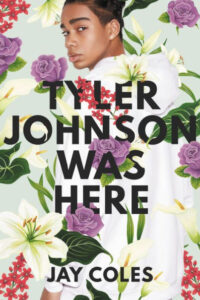 Tyler Johnson Was Here by Jay Coles
Tyler Johnson Was Here by Jay Coles
How It Went Down by Kekla Magoon
I Am Alfonso Jones by Tony Medina
All American Boys by Jason Reynolds and Brendan Kiely
Ghost Boys by Jewell Parker Rhodes
The Hate U Give by Angie Thomas
For more information, see the following resources:
https://www.oif.ala.org/oif/?p=15093
https://www.slj.com/?detailStory=making-the-personal-political-angie-thomas-on-the-hate-u-give
http://oaklandlibrary.org/blogs/childrens-services/talking-kids-about-race-and-racism
http://sfusd.libguides.com/blacklivesmatter
https://www.aclu.org/know-your-rights/what-do-if-youre-stopped-police-immigration-agents-or-fbi
-Lisa Krok is branch manager of Cleveland Public Library’s Harvard-Lee branch, a member of the Quick Picks for Reluctant Readers team, and a Ravenclaw. She can be found being bookish and political on Twitter @readonthebeach.
Filed under: Young Adult Fiction, Young Adult Literature
About Karen Jensen, MLS
Karen Jensen has been a Teen Services Librarian for almost 30 years. She created TLT in 2011 and is the co-editor of The Whole Library Handbook: Teen Services with Heather Booth (ALA Editions, 2014).
ADVERTISEMENT
ADVERTISEMENT
SLJ Blog Network
One Star Review, Guess Who? (#211)
Cover Reveal and Q&A: Dusti Bowling’s Latest – The Beat I Drum (Apr 2025)
Girlmode | Review
The Seven Bills That Will Safeguard the Future of School Librarianship
Gayle Forman Visits The Yarn!
ADVERTISEMENT


